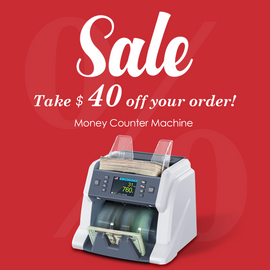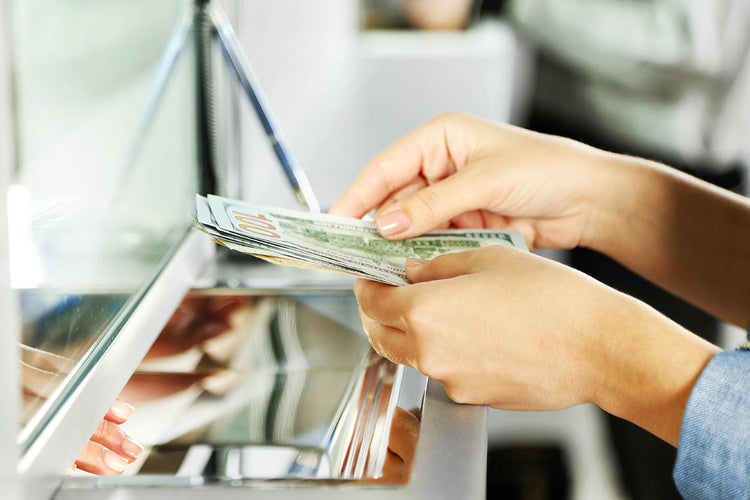As we move more and more quickly towards contactless financial transactions, with cash increasingly being phased out, many people are rightly concerned about how their transactions are being tracked. If you work in a cash business, you may find yourself making regular deposits to banks. But how much can you deposit in one transaction without being questioned on the origins of the cash? There are currency reporting requirements that financial institutions have to adhere to, but whether or not your transactions are being monitored should be your choice. In this article, we are discussing what banks consider a suspicious amount of cash deposited, and how to stay on the right side of the law, while protecting your privacy.
Factors That Influence the Amount of Cash Considered Suspicious
When determining whether or not a cash deposit is suspicious, several factors need to be taken into consideration.
Financial Institution Regulations
Firstly, there are regulations set forth by the financial institution that is receiving the cash. Most financial institutions have specific rules and regulations regarding how much cash can be deposited at one time.To determine if the amount of cash deposited is considered suspicious we first need to understand the guidelines dictating what financial institutions need to do.
Amount of Cash Involved
The amount of cash deposited can also play a role in whether or not it is deemed suspicious. Generally, large amounts of cash are more likely to be flagged as suspicious due to their potential involvement in illegal activities - these would be reported as a ‘suspicious activity’, and so-called Suspicious Activity Reports will be completed by banks for several reasons, and sent to the Financial Crimes Enforcement Network. Let’s explore these in more detail.
What is considered to be suspicious activity?
Many types of suspicious activity might trigger this type of report. The key ones to be aware of are:
- No evidence of legitimate business activity by the parties involved
- Strange financial transactions that don’t marry up with the business type
- Large numbers of bank transfers, repetitive patterns of similar transactions
- Bulk cash and monetary instrument transactions
- Sudden increase in transactions in short periods, especially in previously inactive accounts
- Transactions volumes that are inconsistent with the type of account or activity level as cited by the account holder when opening it
- Transactions where the owner has attempted to bypass reporting requirements
So high transaction amounts, while often cited as the main factor, are just one of many reasons for banks to report you for suspicious activity.
Consequences for Making a Suspected Cash Deposit
If a cash deposit is suspected to be involved in illegal activity, the person making the deposit may be subject to penalties such as fines or jail time. The financial institution may also be held liable for failing to report the suspicious activity. It is important to note that simply making a cash deposit that is considered suspicious does not necessarily mean the person is guilty of a crime; however, it may trigger an investigation into all your financial matters before they can make a decision.

Should You Worry About Your Deposits Over $10,000?
When you deposit cash, the teller will use a specialized bill counting machine to quickly and accurately count the bills. This machine is designed to handle large numbers of notes and has built-in features to scan for counterfeit bills. This ensures that the deposit is accurate and that any counterfeit bills are identified and removed. The question of whether or not you should worry about deposits over $10,000 is a common one. The answer depends on the source of the funds and the laws and regulations in your country or jurisdiction.
In the United States, when individuals or businesses deposit $10,000 or more in cash with a bank or financial institution, it triggers a mandatory report to the Financial Crimes Enforcement Network (FinCEN), as mandated by the Bank Secrecy Act. This is a way for the government to identify and prevent money laundering and other financial crimes. However, it is important to note that just because you deposit over $10,000, it doesn't mean you have done anything illegal. It is merely a part of the regulatory process to maintain the integrity of the financial system!
As long as the source of your funds is legitimate and you can provide a clear and reasonable explanation for the cash deposit, there is no legal restriction on depositing any sum, no matter how large. So, there is no need to overly worry about how much cash you can deposit in a bank in one day.
You should be aware that even if a deposit is not considered suspicious, it may still be subject to taxes. With a tax professional will help you understand the tax implications of large cash deposits and stay on the right side of the law.
If the deposit itself is not suspicious, the source of the funds may be. For example, if the money is coming from illegal activities such as drug trafficking or fraud, it would be considered suspicious regardless of the deposit amount.
If you are concerned about your deposits over $10,000, it's a good idea to speak with a financial advisor or a tax professional to understand the laws and regulations in your area and to ensure that your deposits are in compliance with them. They can also help you understand the tax implications of large cash deposits.
Count your deposits accurately with Ribao Technology
While there is no set amount that is considered suspicious for cash deposits, any deposit that is large enough to trigger suspicion of money laundering or other illegal activities is generally considered suspicious. Financial institutions are required to report cash deposits of $10,000 or more to the Financial Crimes Enforcement Network (FinCEN) in the United States, and taking action to hide the origins of deposits may also raise alarms. . It is always advisable to consult with a tax professional to understand the tax implications of large cash deposits and to be aware of any local laws and regulations regarding cash deposits. If you regularly make cash deposits, then take the hassle out of counting cash with Ribao Technology, where a purchase of BC-40, commercial-spec bill counter can help you understand the exact value of deposits bringing you peace of mind as you’re managing your finances








7 comments
Let me tell you about a hilarious routine I go through every time I make a cash deposit at my bank. Running an ice cream shop means dealing with plenty of cash transactions alongside the plastic. Whenever I gather a hefty sum, over $10,000, and head to the bank, I know I’m in for an adventure.
Picture this: I stroll into the bank with a stack of bills, mostly $20s, accompanied by a few fifties and hundreds. Now, these bills often bear traces of our delicious ice cream – sticky remnants of waffle cone bliss. As I plop the bundle onto the counter, I can almost see the tellers’ nostrils twitching at the scent of freshly made waffle cones.
My son was owed some $ by a family friend who signed over his 13,000 COVID relief check because the friend didn’t have an ID at the time. So then the friend & I thought ok we could kill 2 birds with one stone. He could pay my son what he owed him & get the check cashed as well. Well now the bank wants the owner of the check to go in with his ID to verify his identity & that he did indeed sign the check over to my son. We tried taking the bank a notarized letter proving my friend is who he says he is but that didn’t work. My friend who I recently tried getting in touch with to see if he has gotten his ID cannot be located. So now my son has this $ sitting in his account that he can’t touch because the bank put a hold on it until this man goes in with his ID. So now this money’s just sitting there & my son has decided to go back to school but won’t be able to apply for financial aid over some $ that’s sitting in his account but can’t be touched. Does anyone know how this can be resolved?
Yeah..when an area will not let big banks from coming unto an area..this is a red flag that they are doing illegal activities. But not all the people at the bank who work there know this.
It’s important to recognize that just making a large deposit does not imply criminal activity. Banks consider various factors to determine if a transaction is suspicious, such as the frequency of deposits, the size of the amounts, and the source of funds. If your transaction is flagged as suspicious by the bank, it might be because it triggered certain monitoring criteria. In your case, where you mention a bank freezing your account over a $65.00 deposit, typically such a small amount would not likely trigger a suspicious activity report. If you believe the bank has no valid reason to freeze your account, it is advisable to directly communicate with the bank to understand the specific reasons. If this does not resolve the issue, consider filing a complaint with the Consumer Financial Protection Bureau (CFPB) or your local state banking regulatory agency.
My bank is abusing the suspicious activity situation, I deposited 65.00 to my debit prepay card, because I needed to be able to use their routing and account to pay off my PayPal balance, I don’t give this info on my main/primary cards (social security), so I tried to use a less vulnerable to me, another card, they blocked my account and won’t give me money, over 65.00, violating, abusing the rule of thumb, this is a scam that there are numerous reports off keeping people’s money, by misusing suspicious activity as an excuse, I want to expose these crooks of petty theft, times millions of customers accounts